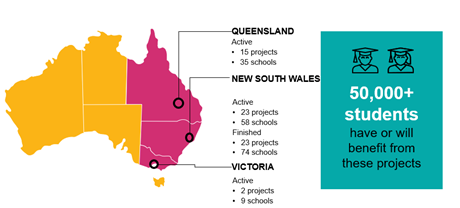News
What is the potential for philanthropy to address inequality within disadvantaged schools?
The VFFF partnership with Australian School Plus is one of our most significant grants, providing $11M over eight years to support the Fair Education Program across NSW.
The primary purpose of Fair Education is to develop the capacity of school leaders in disadvantaged communities to better engage families and communities in their children’s education. The three year program comprises coaching for school leadership teams, funding for school specific projects, ongoing project management and evaluation. VFFF is supporting 132 schools to participate in the program with representation from primary and secondary schools, Department of Education, Independent Schools and Catholic Education. VFFF has also been thrilled to see Fair Ed expand to Queensland and Victorian schools, supported by other funders.
Fair Ed and VFFF are committed to continuous improvement as the program matures, demonstrated by the engagement of the Centre for International Research on Education Systems (CIRES), to conduct an independent evaluation of the program to date. This evaluation also informed a working paper discussing “What is the potential for philanthropy to address inequality within disadvantaged schools?”.
The learnings discussed in this paper are of particular interest to the philanthropic sector and provide insight into how we can influence educational thinking and policymaking, in particular:
- Schools are more likely to commit to school improvement when they are able to innovate on their own terms.
- Disadvantaged schools have a greater need for additional support although lesser capacity to engage in a formal submission process to participate in a program like Fair Education, as well as completing the program and meeting their stated goals – philanthropic dollars can play an important role in these circumstances.
- Philanthropy can play a more flexible role in supporting schools to develop and execute projects they would not otherwise have the funds or opportunity to do.
- The evidence of effective educational interventions for disadvantaged schools, provided from this program, could be used to inform government on how to better support these schools through policies, funding and structural reforms to tackle inequality.
